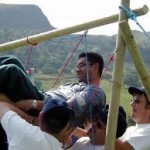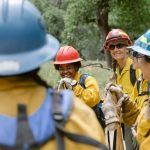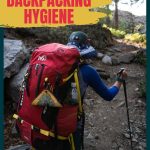
 As visitors to the backcountry, we create certain types of waste which usually cannot be packed out. These include human waste and waste water from cooking and washing.
As visitors to the backcountry, we create certain types of waste which usually cannot be packed out. These include human waste and waste water from cooking and washing.
Human waste. Proper disposal of human waste is important to avoid pollution of water sources, the spread of disease and the aesthetic consequences to those who might see it. Burying human feces in the correct location and manner is the most effective practice for avoiding these problems.
Contrary to popular opinion:, recent research indicates that burial of feces actually slows decomposition in most places. Pathogens have been discovered to survive for a year or more when buried. However, in light of the problems associated with feces left on the ground surface, burial is still the preferred practice. The slow decomposition rate emphasizes the need to choose correct locations for deposition, far from water, campsites and other frequently used places.
Catholes. The “cathole” method is the most widely accepted means of waste disposal. Locate catholes at least 200 feet (about 70 adult steps) from water, trails and camp. Select a site which is inconspicuous, where other people will be unlikely to walk or camp. With a small garden trowel dig a hole 6 to 8 inches deep and 4 inches in diameter. After use, the cathole should be covered with soil and disguised with natural materials. If camping in the area for more than 1 night cathole sites should be widely dispersed.
Latrines. Long-term or large group camping should follow a “concentration” approach to waste disposal. Use similar criteria for selecting a latrine location as those used to locate a cathole. To dig a latrine, start with a cathole and expand it in one direction to develop a trench as successive people use it. Soil dug from the trench is used to cover the feces. The latrine is not naturalized until the group leaves the area. Since this higher concentration of feces will decompose very slowly, location is especially important.
Toilet Paper. Use toilet paper sparingly and use only all-white, non-perfumed brands. Toilet paper must be disposed of properly! Either bury it in a cathole or place it in’plastic bags and pack it out. Toilet paper should not be burned. This practice used to be advocated in some areas but has resulted in numerous instances of forest fires, some of which have cost thousands of dollars to control. The low-impact camper willing to go the extra mile might consider foregoing toilet paper altogether and using “natural” altematives. Popular forms of natural toilet paper include oak or poplar leaves, stones and smooth sticks. Obviously some experimentation is necessary to make this practice work for you, but it is worth a try!
Urination. Urine has liHle direct effect on vegetation or soil. In fact, urine is a fertilizer if anything. Research has found that urine poses very liHle threat to human health. In some instances urine may draw wildlife which are attracted to the salts. They can defoliate plants and dig up soil. If concentrated in one place urine can become an aesthetic impact due to the odor.
Waste water from cooking. Soap is unnecessary for most dish washing jobs. It is often diMcult to rinse thoroughly and introduces unnatural chemicals to the backcountry. Hot water and a little elbow grease can tackle most cleaning chores. Waste water should be scaHered over a wide area away from camps and all water sources. Remove all food particles from the water before disposing of it and pack them out with excess food and other litter.
Waste water from washing. The primary consideration when washing yourself or your clothes is to avoid contamination of water supplies. Soap, even if biodegradeble must not enter lakes or streams, so it is best to minimize its use. If bathing with soap is necessary, get wet, lather up on shore far from water (200′) and rinse off with water carried in a pot. This procedure allows the soap to break down and filter through the soil before reaching any body of water. Clothes can be cleaned by thorough rinsing. Soap is not necessary, and residual soap can cause skin irritation.
Fishing and hunting. Fish viscera are generally a natural part of the ecosystem. In high-use areas consider bllrying them in a cathole to reduce the chance that other people will come across them. If you are just out fishing for the day, take your fish home to clean them and dispose of entrails there. In remote areas that receive little use, viscera can be scattered widely, out of sight and away from campsites. In bear country or where other animals might present a problem, keep fish odors safely downwind and away from people, trails and campsites, whether you scatter or bury the entrails. Do not throw viscera back into lakes and streams- the cool temperatures in most mountain waters prevent rapid decomposition.
If you are a hunter, be courteous to other hunters and backcountry visitors by field dressing game animals well away from trails and water. This will also help reduce encounters between people and scavenging wildlife. Some public lands do not allow hunting, and it is usually carefully regulated where it is permitted. If you have any doubt about an area in which you will be traveling, check with the local managing agency for regulations or suggested practices.



